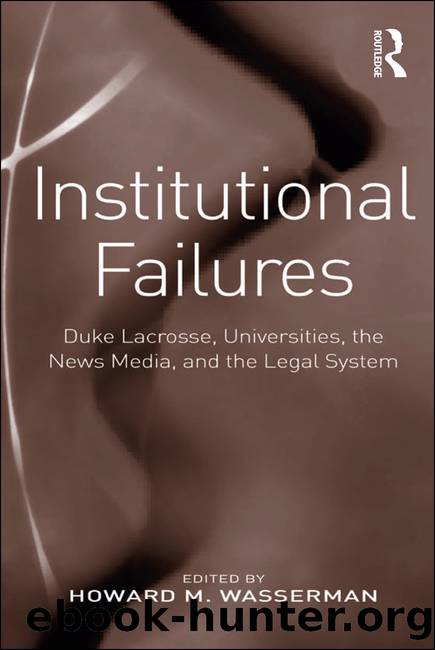Institutional Failures by Wasserman Howard M.;

Author:Wasserman, Howard M.;
Language: eng
Format: epub
Publisher: Taylor & Francis Group
Published: 2011-08-15T00:00:00+00:00
An Embattled Faculty: Did They Deserve Better?
Any fair assessment of the faculty-administration nexus at Duke during this contentious period must credit the many professors who quietly and willingly served on five committees that President Brodhead appointed within two weeks of the party and, despite adverse publicity, ensured a degree of faculty-administration collaboration that skeptics might have doubted would occur. There is no public record of any professor refusing to serve, although these councils might well reach conclusions uncongenial to widely prevalent faculty views. The earliest group to report did, in fact, express just such dissonant findings. The faculty members serving on the Athletic Council concluded that, although lacrosse players had abused alcohol and exhibited other âirresponsible behaviorâ exceeding the norm for Dukeâs sports programs, they could not fairly be charged with a pattern of racist behavior or sexual misconduct of the type early critics had cited. This committee specifically urged that the team be allowed to resume competition the next academic year and that the athletics department should develop a code of conduct for all sports.48
Other faculty committees continued deliberating through the spring and summer of 2006, without apparent dissension. Indeed, the one defection is striking because of its novelty. Soon after President Brodhead announced the reinstatement of two of the three indicted athletes, English professor Karla Holloway resigned in public protest from the Campus Culture Initiative Steering Committee. Her goal was strategic; she had been a prime mover in the Group of 88 and had initially agreed to chair the Culture Initiativeâs subcommittee on race. But she now declared that she âcould no longer work in good faith,â viewing the readmission of the suspended players as a âbreach of common trust.â She elaborated on the reasons for her defection: âThe decision by the University to readmit the students, especially just before a critical judicial decision on the case, is a clear use of corporate power and a breach, I think, of ethical citizenship.â49 The CCI continued without Professor Holloway, identifying and proposing remedies for a number of weaknesses in campus culture.
One would be naïve to infer from this general pattern of civility and collegiality that the months following the initial charges against the lacrosse team were easy ones for most Duke faculty. Members of the Group of 88 were obvious and visible targets of criticism and worse. Political Science professor Rom Coles, one of the adâs sponsors, reported that âall of us who signed that have received hundreds of hate mails and hate callsâitâs an unbelievably vitriolic set of representations.â50 Others reported explicitly demeaning or disparaging, and occasionally even threatening, messages in electronic form; Professor Holloway, for example, told a reporter she âdreads reading her e-mail now but must go through it to make sure there arenât any physical threats.â51 Professor Wahneema Lubiano, another of the Group of 88 organizers, reported that she and other signers had received what The Chronicle of Higher Education described as âhundreds of e-mail messages, some of which were racist, sexually explicit, or otherwise vile.
Download
This site does not store any files on its server. We only index and link to content provided by other sites. Please contact the content providers to delete copyright contents if any and email us, we'll remove relevant links or contents immediately.
The Thirst by Nesbo Jo(6446)
Permanent Record by Edward Snowden(5547)
The Myth of the Strong Leader by Archie Brown(5244)
Spare by Prince Harry The Duke of Sussex(4799)
A Higher Loyalty: Truth, Lies, and Leadership by James Comey(4559)
Secrecy World by Jake Bernstein(4402)
Adulting by Kelly Williams Brown(4240)
The Borden Murders by Sarah Miller(4028)
Killers of the Flower Moon by David Grann(3755)
Machine Learning at Scale with H2O by Gregory Keys | David Whiting(3653)
Fear by Bob Woodward(3529)
American Kingpin by Nick Bilton(3511)
The Secret Barrister by The Secret Barrister(3428)
Future Crimes by Marc Goodman(3376)
The Last Girl by Nadia Murad(3345)
The House on Mango Street by Sandra Cisneros(3233)
Liar's Poker by Michael Lewis(3230)
The Social Psychology of Inequality by Unknown(2771)
Graduate Admissions Essays, Fourth Edition: Write Your Way into the Graduate School of Your Choice (Graduate Admissions Essays: Write Your Way Into the) by Asher Donald(2741)
